Parroting
02/02/25 11:42 Filed in: Family
The girls got to meet some parrots recently and get photos taken. They do love their experiences.

Vada

Victoria

Vada

Victoria
Comments
Responsible Jesse
31/01/25 15:39 Filed in: Family
Jesse got a certificate for responsibility at school and we have the goods (photo) to show for it. Kids do seem to like getting recognition. Vada has a binder to put her certificates in that uses page protectors too. Pleased that they are enjoying their school activities.


Cat Colour Mountain Sunrise
26/01/25 09:06 Filed in: Berlin Community | Photography
Another colorful sunrise, with the outline of our cat weathervane in foreground looking like it is ready to step off and walk along the mountains. Cold morning so had to hunker down to get that composition.
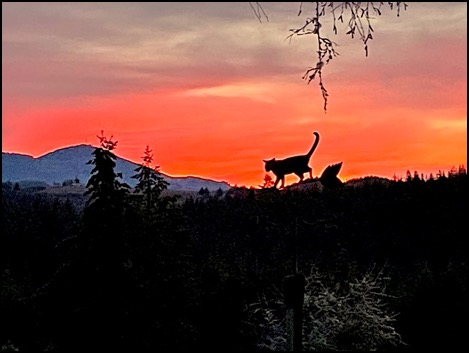

Unicorn Fans
16/01/25 16:31 Filed in: Family
The girls do enjoy their unicorns and when it comes as a warm sleepwear for a cold winter's time - Zooey!


Reservoir Lake Near Cougar WA
11/01/25 15:00 Filed in: Photography | Nature
We took a drive up the south side of Mt. St. Helens to visit along the lakes and reservoirs on the way to Cougar, WA. This is Yeti or Sasquatch country. We took the way back through Yacolt and Battle Ground, WA to the hotel. The weather was "wet", pouring rain. It is really grown up out there with lots of homes hidden in the hills and forests.
Here is one the reservoirs just down the road from Cougar.
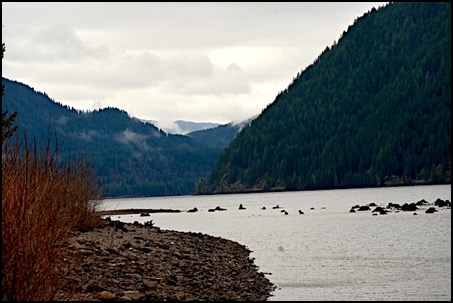
Here is one the reservoirs just down the road from Cougar.

A Fire Brightly
04/01/25 10:21 Filed in: Travel
The fire in the fireplace at Hotel Indigo give off warmth and a glow on a cool, quite rainy evening. A pleasure to behold.


Happy Birthday To Me
02/01/25 22:11 Filed in: Personal
We went out to dinner this evening to Salty's on the Columbia River. Lots of nice memories of dinners with friends and also a post-review Winn Feline Foundation board and reviewer dinner in March of 2018. It was a great dinner.
Tonight it was quieter though we had a lovely dinner looking over the river to Vancouver and watching planes coming in to land at PDX. A toast to the evening and then we retired in the rain back to the Hotel Indigo along the waterfront in Vancouver. A very comfortable hotel to stay at.

Tonight it was quieter though we had a lovely dinner looking over the river to Vancouver and watching planes coming in to land at PDX. A toast to the evening and then we retired in the rain back to the Hotel Indigo along the waterfront in Vancouver. A very comfortable hotel to stay at.

New Year's Resolutions 2025
New Year's Resolutions
Personally I don't do them since I don't hold to making it stick. A few this year could be one that I saw this morning about reading more (and crafting more). I need to be more active - move more and use the treadmill more.
Read about what is the possible history of 4000 years of making resolution promises:
"It’s believed the rest of the common folk, spared of such physical punishment, instead engaged in prayer, promising that they would repay their debts and otherwise conduct themselves in sterling fashion to please the gods.
"While the Babylonians may have been the first to introduce these promises to a celebration marking the start of the year, the Romans were the first to deliver theirs in January. For that we can thank the wide-reaching Roman calendar, which moved the first month of the year from March to January. Named for the two-faced god Janus, who both looked back at the past and faced the unknown future, the first month became a time for officials to pledge their vows of loyalty to Rome — a custom that continues in the less urgent but no less earnest tradition of the countless people who pledge to get off the couch and hit the gym in the new year."
Personally I don't do them since I don't hold to making it stick. A few this year could be one that I saw this morning about reading more (and crafting more). I need to be more active - move more and use the treadmill more.
Read about what is the possible history of 4000 years of making resolution promises:
"It’s believed the rest of the common folk, spared of such physical punishment, instead engaged in prayer, promising that they would repay their debts and otherwise conduct themselves in sterling fashion to please the gods.
New Year's Eve Morning
31/12/24 07:40 Filed in: Photography | Berlin
It is just before 7:30 a.m. on 2024's New Year's Eve Morning. It is a frosty morning at 30 degrees F. The roof and trees look tinged with frost. Stepping out on the deck, it is quiet and calm in the countryside with a hint of the beginning dawn above the mountains which shortly grows to a glorious red glow, even through the trees. So peaceful, hard to believe we may hear firecrackers or shots as midnight comes later at night. At least, no rain for now though fog is likely present in the valley.
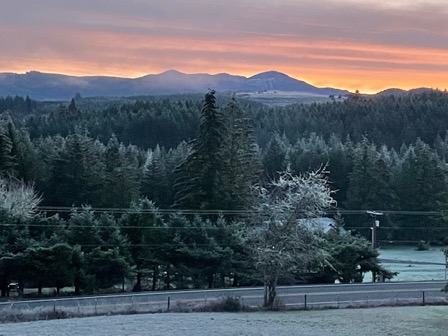
Frosty early sunrise
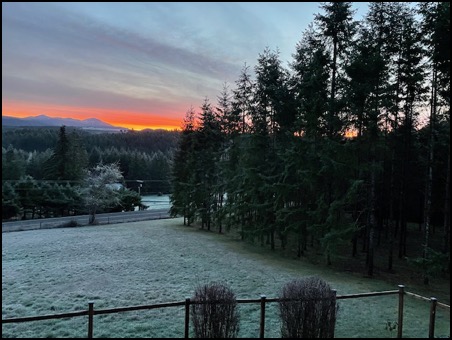
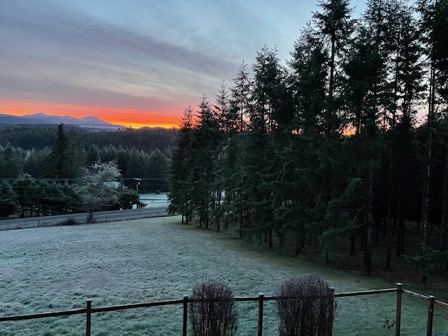
Followed by color

Frosty early sunrise


Followed by color
Dinner on Christmas Eve
25/12/24 09:29 Filed in: Family
Here we are together with Scott's family out at 1847 Bar and Grill for Christmas Eve dinner. The restaurant offered a large prime rib which was very tasty with mashed potatoes and broccolini. The girls ate well. We had cards and gifts ready for 3 of our favorite servers though one was not working tonight (Kaylee). It was the best thing of the night to give them a thank you gift.



